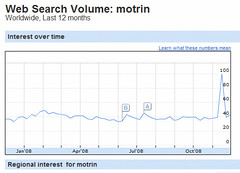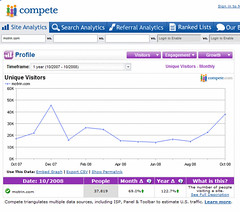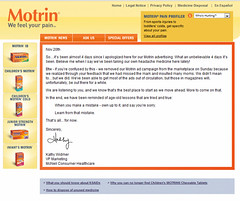A few weeks ago, the Motrin Moms kerfuffle blew up and I tracked it by the numbers just a few days after the explosion. Nearly three weeks later, it’s time to revisit the incident to see what’s happened.
[Brands that get punk’d by social media have an opportunity to quickly respond and enable the groundswell to pirouette the energy towards a positive direction]
Running the numbers you can see interest has piqued for Motrin:

People are curious: Google insights indicates a spike in searches for the term “Motrin”.

There’s more interest in Motrin than other competitors: comparing terms “Motrin” to “Tylenol” and “Ibprofen” other brands in the space, there’s a peak that outperforms the market.

Alexa, a third party traffic monitoring tools, shows a lift in traffic to motrin.com

Compete.com, a third party traffic monitoring service, also shows a lift in traffic to Motrin.com

Despite this interest the Motrin has generated the corporate webpage still has an apology dated from Nov 20th (today is Dec 4th)
Motrin misses an opportunity by sulking in the corner
Unfortunately, not much has happened from Motrin’s behalf. The motrin.com corporate homepage is dated with an apology from Kathy Widmer dated Nov 20th and referencing an apology “4 days ago”. Whether or not you think that Motrin did something wrong with their ad or not it really doesn’t matter, as there’s an opportunity being wasted that Motrin should leverage. My job is to help the largest brands in the world understand and benefit from connecting with their customers using web tools, and if motrin were my client, I would advise them with the following:
[Rather than wallow in sorrow, Motrin should leverage global interest in it’s brand. Rather than telling customers what pains them, Motrin should benefit from word of mouth by asking the community “what pains you?”]
Rather than cower in the shadows, Motrin should:
1) Stop Reacting and Develop a Strategy To Lead: Learn how to Judo throw by using the weight of the Groundswell to aid you. Before deploying any tactics, first understand that there are many eyeballs now on Motrin and in some PR circles this is good press from bad –leverage it. If you’re listening to a recent podcast episode of For Immediate Release there’s global attention on Motrin within the social media circle that is quite amazing since the product is only sold in US.
2) Remove the Apology: Suck it up and take that down the mea culpa. In the scheme of things, not every mother was insulted, and the Motrin moms is not indicative of what’s being said by moms that didn’t even see the video ad. Motrin has responded quickly, removed the ad and given a sincere apology in my opinion. Great, now it’s time to move towards the path of recovery.
3) Listen to the Community by Asking “What Pains You”: At Forrester, we use the term “Listening” as one of the objectives for social computing, suggesting that brands can better understand their customers by gleaning insight to what’s already being said. Here’s the opportunity for Motrin to leverage the Groundswell, since many members have already created their own ads (such as this clever play on big boobs), build off the momentum and develop a program to ask mothers what pains them. Obviously telling them what pained them, and playing the empathy card backfired, so instead, just ask them. Allow them to tag the videos, photos, and blog posts with #whatpainsme.
4) Allow the Groundswell to Advertise on Your Behalf: Now that this content has been created by the community, aggregate the popular posts, tweets, video and images on your blog, or corporate homepage, and allow the discussion to continue. Fortunately for Motrin, the worst criticism has already occured, so by even including negative submissions shouldn’t be a problem. By doing this, Motrin will be the center of discussion around pain –which can offer a solution with their relief products.
The above example is advice I would give Motrin if they were my client, but I’m sure there are plenty of other ways to allow both the community and brand to win.
That’s just my take, if you were reporting to the VP of Marketing at Motrin, what would you recommend they do?
Step #4 in particular is spot on. I (as many are) am a big believer that over the next decade more and more traditional advertisements will be written (architected) by the consumer, and not the brand (see an earlier blog post I wrote on how consumers will ultimately create the products themselves).
Motrin HAS an excellent opportunity to let the consumer tell THEM what the actionable items should be here. Not only will this result in an ad campaign that will garnish a better response (and hence better ROI), but it will provide Motrin’s Marcom team with invaluable research.
This is exactly the way they can also allow a campaign to go viral, as the discussion gets passed around, and continued. Lastly let’s not leave out all the Google food that this new discussion thread will provide for months to come.
http://www.twitter.com/A_F
Jeremiah:
Good summary and advice here. The fact that a two-week old apology is taking up almost the entire homepage is crazy. Removing that would be a good start. Do a Google search for “Motrin.” That apology text is part of the very first listing. Not good, obviously.
You’re suggestion No. 3 is a brilliant one, but — Motrin would need to have a smart team ready to get out and engage on Twitter, blogs, etc. to pull it off. No way of knowing if they’re ready to do that (though my guess is no).
By way of disclosure, Johnson & Johnson is a client, but we are not involved with the Motrin brand.
Bryan Person | @BryanPerson
LiveWorld
Andrew, we have some interesting research coming up that you’ll find spot on to that point.
Bryan, There’s a big opportunity for LiveWorld to help out here, I hope Motrin speaks to your team.
Right, Jeremiah. When I said we’re not involved, it doesn’t mean we’re not trying to get their attention!
Great post. I think the key point here is embedded in number 3. Effective communication — technology-enabled or otherwise — is as much (if not more) about listening than about talking. Perhaps their initial ad demonstrated a certain level of deafness but as you point out, they have a great opportunity right now, while people are paying attention, to practice good listening and really get in tune with their market.
This whole issue represents an amazing opportunity for Motrin — I completely agree with the four points above, and would suggest that it would be a simple thing to change this around. It’s true that the slings are a hot item; instead of making it a derogatory reference, turn it around and tell them that they’re doing the right thing! “Research indicates that the use of slings solidifies bonding, comforts the child, blah blah… but what the research doesn’t tell you is that mom’s back hurts. Fix it with Motrin…”
Motrin didn’t get punk’d by soc med. If anything, either they got punk’d by their ad agency or they punk’d their customers.
I’d advise Motrin to contact every blogger, twitterer, who responded to Motrin’s ad and A. apologize; B. ask what do they need to do to make it right; C. ask them to create a new ad or a new site or a council or a community forum; D. thank them publicly for any assistance.
We understand mistakes happen. But it’s an opportunity to correct and strengthen the relationship if the one in error responds personally.
I’m a mom. I have a sling, nursed my kids and am friends with the women that did the Motrin spoof regarding implants. I also work in marketing/advertising. I was not offended, but did think that they missed the mark initially.
I absolutely agree, yank that apology and take advantage of the focus. It’s 12/4, the apology posted the 20th of November.
Some companies struggle to spark a conversation, they want in, but don’t know how to go from outside looking in to actually being inside”Motrin got in, and I did appreciate that they were trying to talk to me. They risk insulting their audience all over again if they don’t start talking.
So, I’d say, let’s ask them what hurts.
With short memories on the Web (especially Twitter), by all means take down the mea culpa. Then engage the aggrieved mothers. Give them a place to post. Surely the anger has subsided? Health is such a personal topic. Adding motherhood the mix amplifies..
I’m interested in the role of medical / regulatory processes in pharma marketing’s speed-to-market in all of this. One of the crucial characteristics in social marketing is organizational agility within the conversation – basically the ability to approve and publish marketing messages quickly. This is a huge obstacle in large companies, but an even bigger one (often impassable) in a market where anything you say could bring huge liability.
In the Motrin example, they probably “fast-tracked” the apology – but could it be that now they are back to standard long-run processes that require thorough review of any messages that get published to the public?
Is it that they are missing an opportunity? Or is it that they are simply handcuffed by conservative (and likely rightfully so) marketing review policies?
I don’t think this is as big of an issue as some PR people would like to believe. It seems very contained to the early adopter technology world who wants to get blog traffic by discussing a “crisis,” and Motrin isn’t in the early adopter product life cycle.
My guess is they are just letting it pass. It’s such a minor and unimportant issue that they know people will forget about it. Add that to the fact that if you’ve ever played sports or had a minor injury, doctors still to this day prescribe you with Ibuprofen (Motrin) because it helps reduce swelling.
I think they are doing exactly what they should be doing… ignore it. People who buy (Motrin or Advil) know they are buying Ibuprofen, which is sold in generic form, and they know what it’s purpose is.
setup twitter similar to comcastcares: twitter.com/motrinfeelsyourpain
No, but really, find out really why mother’s take Motrin (in general and specifically why Motrin). Keep your current target, revise the message, show you are learning.
pretty much has been said.
Russ
It’s hard to tell if this changed mainstream perception of the brand, or impacted sales.
There’s no doubt it does hurt the marketing, SEO, and caused brand damage.
Do a search for Motrin on Google, and you’ll see TWO results on the front page be of the negative backlash.
Mainstream media picked up on this story –causing further damage.
Summary: It’s not as big as some may say, but it shouldn’t be as diminished as you may suggest.
Doug Wick @10 — I think you’re onto something, and I’d bet that genuine liability issues have become so entangled with J&J’s marketing S.O.P.s that they can’t tell one from the other.
In other words, they DO know that product-oriented press releases, advertisements, et cetera must be vetted carefully to avoid (real) liability threats. But this creates a default position of high caution & very deliberate (read: “slow”) reaction times for *any* outward-facing communication, even ones that pose no real liability and for which speed of response is of the essence.
It’s not that I have any special knowledge of the innards of J&J, but that I’ve seen this type of confusion in one organization after another.
Spot on, Jeremiah. We so rarely come back to these things. I love it when a company takes a punch (like Comcast did) and learns from it and becomes better. I just wish they could move more quickly!
Thanks for Sharing, Jeremiah. Yep- you are spot on. Regarding #3- that is the sweetest gift of all. There is feedback and customer requests floating in the community- Motrin just has to listen.
I am particularly interested in {what I think is} your upcoming research on “advertising” that is architected by the consumer & how those messages are received by the target. There is huge opportunity to leverage the voice of “independent experts” Time is of the essence for Motrin.
I’m piling on to recommend they take down the apology too!
Large brand Corporate America does not yet get it. Brands belong to consumers. Always have.
The marketing VP could at a minimum offer her personal email contact (even better, her direct phone line) and sincerely be open to feedback. She could ask: “What would you moms like to hear from us?” “How can we help now that we know we missed the mark?” “The moms on the Motrin team have been mobilized! We’re listening…”
Even major brands shouldn’t require a 6-week corporate-strategy-decision-making process to be open to consumer feedback. And let’s hurry up and recruit the moms from ANY department at McNeil Consumer Healthcare to begin to move the ball forward. Ask their consumer support folks for ideas on what’s next. Ask anyone at McNeil that interacts with their customers.
Less marketing. More connecting with moms.
I also covered the Motrin Mom backlash on our jhP company blog. Then immediately met with our Technomarketing Team to discuss how we’d react if they were our client.
The thoughts we had were very similar to what you expressed in Step #3 “ use this as an opportunity to listen, reach out, and then empower members of the community to become Brand Champions for Motrin (they are obviously very passionate).
We appreciated the (relatively) quick apology that Motrin issued, but thought it fell flat since it was placed on their homepage and wasn’t broadcast in any of the channels that were creating the Groundswell to begin with.
The key factor that Motrin seemed to miss out on was the opportunity for engagement.
Love what you did here in showing clear data (graphs) indicating the increased awareness and interest.
I think they have missed the opportunity to engage the audience they had the week of the “incident”. Many bloggers (including me) wrote about the Motrin “Momologue” and would have been happy to share what really “pains” us. For example as a mom, my car seat that I carry my infant in bruises my leg when I carry it, and when my three year old screeches I might get a headache. I suspect a few moms (and dads) would feel my pain. Motrin would have been able to have some great feedback, and conversations on and off of their own site.
I am a little surprised by the first comment listed here by Andrew:
“I (as many are) am a big believer that over the next decade more and more traditional advertisements will be written (architected) by the consumer, and not the brand.”
That is the way it should always be and if you consider your target audience first, it will be.
But I do believe that is where the real problem lies with Motrin. They forgot who their target audience was and allowed an ad agency to talk them into something completely off base.
So, my only concern with all that you have suggested (great points by the way) is that it would need to be executed by an ad agency and to try and optimize this opportunity with their existing agency, could very easily place them in a much more damaging situation. If they did not know that those ads were potentially offensive before they launched, there is little hope they would “get it” in time to capitalize on this opportunity.
I have to agree with the steps you outline, as a social media consultant I recommend that clients be transparent and use social media for what it was intended – to connect with clients. Hiding in the corner doesn’t count.
Since, Jessica Gottlieb, who started the uproar on Twitter is a friend of mine, we have been discussing this quite a bit. One thing that Motrin didn’t do was reach out to her (beyond the apology – which admittedly was prompt and to the point). Most bloggers, Tweople and other social media users are quite approachable.
Large companies need to know that picking up the phone (or Blackberry) and developing a dialogue with consumers is not only prudent, it is forward thinking.
One other point is that Motrin should keep an eye on social media. My clients are often marketing to mothers. I KNOW who the top bloggers, Tweople and Facebook users are in that market.
They should too!
sports shoes
Nike Sport Shoes
Women's Nike Sport Shoes
Men's Nike Sport Shoes